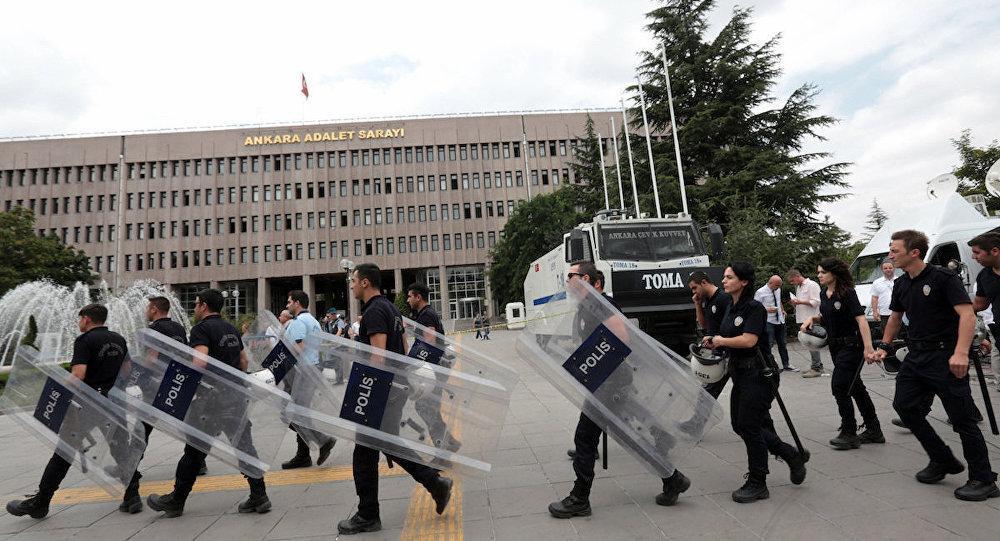Fight against terrorism foremost problem, followed by FETÖ, Turks say
ISTANBUL

Turkish people regard terrorism as the foremost and the fight against the Fethullah Gülen Terror Organization (FETÖ) as the second most significant problems facing the country, according to an annual survey by Istanbul’s Kadir Has University.
“Terrorism, seen as the most important problem in 2016 with 35 percent, has kept its top position in the country’s agenda in 2017, though it has dropped to 29 percent,” read a statement accompanying “The Survey on Social and Political Trends in Turkey,” which was released on Jan. 31.
The FETÖ, widely believed to have masterminded the July 2016 coup, was identified as a problem by only 1.3 percent in 2015.
However, it shot up to the country’s second most serious problem with 25.2 percent in 2016 following the coup attempt.
The new survey showed that the FETÖ continues to be viewed as the second most serious problem in Turkey in 2017, with 18.1 percent.
When respondents were asked what they regarded as Turkey’s most significant problem, those answering “unemployment” went from 10.5 percent to 17 percent this year, while those answering “the high cost of living” went from 9.8 to 13.1 percent.
Geographically, those residing in Marmara, Black Sea and Central Anatolia regions regarded “terrorism” as the top problem, while those residing in Aegean, Mediterranean, Southeast Anatolia and Eastern Anatolia regions identified “unemployment” as the top issue.
When asked “what is the most serious problem of the Turkish economy at the moment,” 16.9 percent replied unemployment, while 14.1 percent stated depreciation of the Turkish lira.
The increase in the price of food products, inflation and high interest rates were identified as the other most critical issues of the economy.
Still, the number of those who find the government’s economic policies to be successful rose strikingly. While the rate of those founding the government’s economic policies “successful” or “very successful” was 38.7 percent last year, this figure went up to 47.7 percent this year.
The number of respondents who welcomed economic policies increased significantly among the ruling Justice and Development Party (AKP) voters.
The respondents who voted for other parties mostly described the economic policies as “unsuccessful.”
According to results of the survey conducted through face-to-face interviews with 1,000 respondents in 26 cities, the percentage of those who find the government’s foreign policy successful went up to 45.9 percent from 35.2.
The percentage of those who think the government’s foreign policy is “definitely successful” and “successful” stood at 75.2 percent among AKP voters, 27.5 percent among Nationalist Movement Party (MHP) voters, 19.9 percent among main opposition Republican People’s Party (CHP) voters, and 11.1 percent among Peoples’ Democratic Party (HDP) voters.
Although 71.4 percent of respondents supported European Union membership in 2014, this rate decreased to 65.1 percent in 2015 and 45.7 percent in 2016.
This three-year downward trend was broken this year as support for EU membership rose to 57.8 percent. While 43.6 percent of the Turkish population support continuing talks with the EU, 59.2 percent support Turkey’s continued membership in NATO.
“It is possible to say the Turkish people have not yet made up their minds on whether Turkey can ensure its security internationally without being a NATO member,” read the statement by the university.
“Indeed, 39.8 percent of respondents think that Turkey can provide for its security without being a NATO member, while 37.7 think it cannot.”
In 2016, Israel ranked first among the countries posing the biggest threat to Turkey with 73.3 percent. This year, the United States is seen as the biggest threat with 64.3 percent, with Israel falling to second spot with 61.4 percent.
Azerbaijan was again reported as the most important friend/ally at 67.8 percent.
Turkish Cyprus and Russia followed.
A team composed of Kadir Has University Rector Prof. Mustafa Aydın, Prof. Hasan Bülent Kahraman, Prof. Osman Zaim, Prof. Banu Baybars Hawks and Dr. Cihan Dizdaroğlu conducted the study.
















